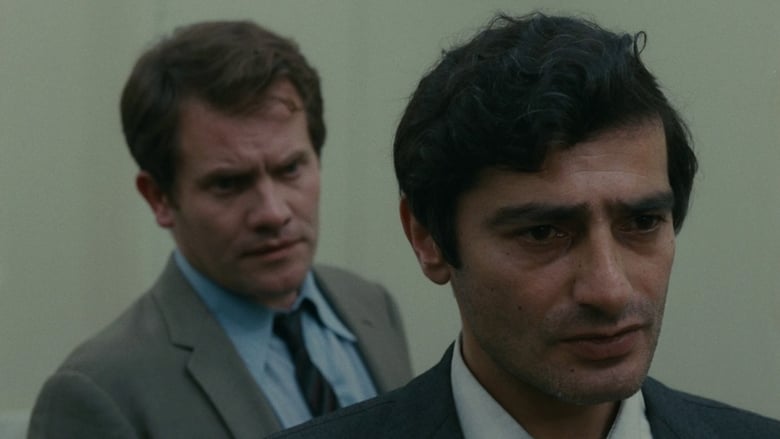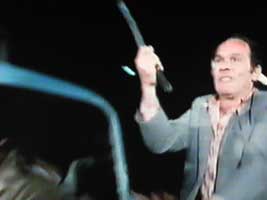← Back to Reviews

in
Z (Costa-Gavras, 1969)

Fantastic political mystey-thriller which may seem even better today than it was 40 years ago. Greek expatriate Costa-Gavras directs a story which actually happened near his hometown in a film based on the "novel" by Vasilis Vasilikos which tells of an actual murder of a leftist politician and the cover-up by the military to make it look like an automobile accident. During the opening credits, a disclaimer appears on screen which reads as follows: "Any resemblance to real events, to persons living or dead, is not accidental. It is DELIBERATE." Yves Montand is dynamic as the politician (simply known as "the Deputy") who appeals to the younger generation, but after a rally where he speaks about nuclear pacifism, he exits his hall and finds a surreal situation where the police are present but seem to be doing nothing to control a mob of anti-Communists who are threatening violence. Well, violence ensues and the Deputy is struck by a car but also by what appears to be a stick to the head from someone in the car. This blow ostensibly leaves him brain dead, but a photographic journalist witness (Producer Jacques Perrin) has visual evidence that some of the statements concerning the "accident" which the military are telling are untrue.


The Deputy eventually dies in the hospital, in the presence of his wife (Irene Papas), and a young magistrate (Jean-Louis Trintignant) is assigned to investigate further and get to the bottom of what really happened. There are plenty of lower-end thugs who did the dirty work, such as Yago (Renato Salvatori) who drove the three-wheeled "Kamikaze" which was used during the incident and his ex-con friend Vago (Marcel Bozzuffi) who actually did the striking of the Deputy's head. (These are not spoilers - this all takes place in the first part of the film and it's pretty clear who did what at the time. What makes the film a tense mystery is finding out if the photojournalist and the Magistrate are able to unravel the conspiracy before such overwhelming odds and powerful rivals.) In fact, the scene directly following the attack, where a man chases the Kamikaze, hops onto the flatbed and fights it out with Vago while the car races through the city with Mikos Theodrorakis' percussive musical score as propulsive backbeat is one of the film's highlights. On the other side is stubborn, injured witness Nick (Georges Geret) who remains adamant in telling the truth of what he saw and what happened to him, no matter what happens to him and his family.
There are also plenty of strong supporting characters on both sides of the question. The political supporters of the Deputy have to confront several problems before the rally even begins because their permits were pulled in an attempt to silence the Deputy. These characters certainly come across as passionate and sympathetic. On the other hand, most of the Military Police characters come across as wily and duplicitous, but since we know this is based on a true story, and we know whose side Costa-Gavras and his co-scripter Jorge Semprun are on (they'll say the side of justice), it's OK to see the lines drawn quite strikingly between the two sides. Although the film is very tense and contains bursts of violent movement and more subtle camera movement, it also contains plenty of dialogue. Most of this dialogue is quite satirical and used not only as a way for characters to communicate but also for them to slip up and make mistakes which the honest Magistrate is very capable of deducing throughout the movie.
Although the name of the European country is never specified in the film, we all know that it's meant to be Greece. However, at the time that the film was made, Greece was impossible to use as a shooting location, so most of the filming was done in Algeria. Many of the people involved in the film could not live freely in Greece (the composer was actually imprisoned at the time and had to have his musical score smuggled out to Costa-Gavras). I don't want to give away what the repercussions of the investigation led to or what the title actually means because that's all covered in the latter part of the film and just adds to its overall power. But I will say that Z won Oscars for Best Foreign Language Film and Best Editing and that it was also nominated for Best Film, Best Director and Best Adapted Screenplay. Midnight Cowboy actually won those last three awards.

Fantastic political mystey-thriller which may seem even better today than it was 40 years ago. Greek expatriate Costa-Gavras directs a story which actually happened near his hometown in a film based on the "novel" by Vasilis Vasilikos which tells of an actual murder of a leftist politician and the cover-up by the military to make it look like an automobile accident. During the opening credits, a disclaimer appears on screen which reads as follows: "Any resemblance to real events, to persons living or dead, is not accidental. It is DELIBERATE." Yves Montand is dynamic as the politician (simply known as "the Deputy") who appeals to the younger generation, but after a rally where he speaks about nuclear pacifism, he exits his hall and finds a surreal situation where the police are present but seem to be doing nothing to control a mob of anti-Communists who are threatening violence. Well, violence ensues and the Deputy is struck by a car but also by what appears to be a stick to the head from someone in the car. This blow ostensibly leaves him brain dead, but a photographic journalist witness (Producer Jacques Perrin) has visual evidence that some of the statements concerning the "accident" which the military are telling are untrue.


The Deputy eventually dies in the hospital, in the presence of his wife (Irene Papas), and a young magistrate (Jean-Louis Trintignant) is assigned to investigate further and get to the bottom of what really happened. There are plenty of lower-end thugs who did the dirty work, such as Yago (Renato Salvatori) who drove the three-wheeled "Kamikaze" which was used during the incident and his ex-con friend Vago (Marcel Bozzuffi) who actually did the striking of the Deputy's head. (These are not spoilers - this all takes place in the first part of the film and it's pretty clear who did what at the time. What makes the film a tense mystery is finding out if the photojournalist and the Magistrate are able to unravel the conspiracy before such overwhelming odds and powerful rivals.) In fact, the scene directly following the attack, where a man chases the Kamikaze, hops onto the flatbed and fights it out with Vago while the car races through the city with Mikos Theodrorakis' percussive musical score as propulsive backbeat is one of the film's highlights. On the other side is stubborn, injured witness Nick (Georges Geret) who remains adamant in telling the truth of what he saw and what happened to him, no matter what happens to him and his family.
There are also plenty of strong supporting characters on both sides of the question. The political supporters of the Deputy have to confront several problems before the rally even begins because their permits were pulled in an attempt to silence the Deputy. These characters certainly come across as passionate and sympathetic. On the other hand, most of the Military Police characters come across as wily and duplicitous, but since we know this is based on a true story, and we know whose side Costa-Gavras and his co-scripter Jorge Semprun are on (they'll say the side of justice), it's OK to see the lines drawn quite strikingly between the two sides. Although the film is very tense and contains bursts of violent movement and more subtle camera movement, it also contains plenty of dialogue. Most of this dialogue is quite satirical and used not only as a way for characters to communicate but also for them to slip up and make mistakes which the honest Magistrate is very capable of deducing throughout the movie.
Although the name of the European country is never specified in the film, we all know that it's meant to be Greece. However, at the time that the film was made, Greece was impossible to use as a shooting location, so most of the filming was done in Algeria. Many of the people involved in the film could not live freely in Greece (the composer was actually imprisoned at the time and had to have his musical score smuggled out to Costa-Gavras). I don't want to give away what the repercussions of the investigation led to or what the title actually means because that's all covered in the latter part of the film and just adds to its overall power. But I will say that Z won Oscars for Best Foreign Language Film and Best Editing and that it was also nominated for Best Film, Best Director and Best Adapted Screenplay. Midnight Cowboy actually won those last three awards.
